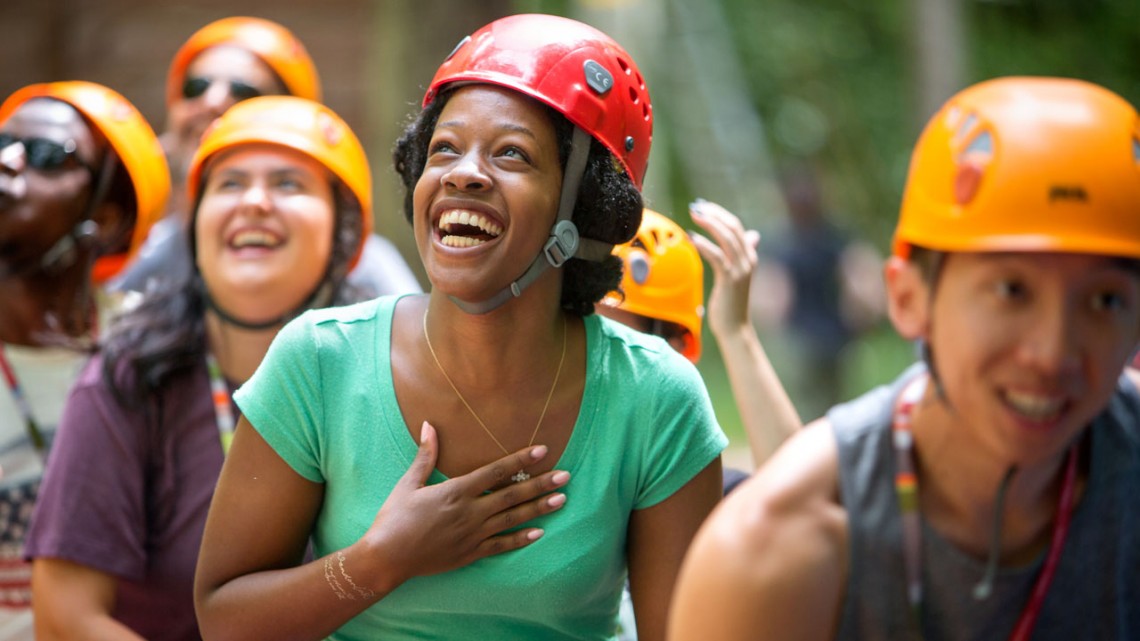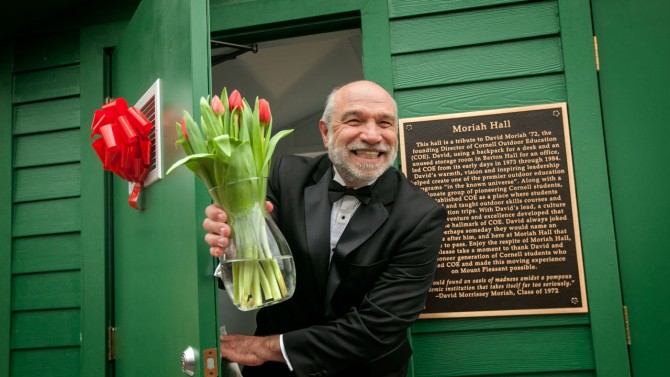
Law School students participate in teambuilding exercises at the Hoffman Challenge Course.
Cornell Outdoor Education expands student access
By Kaitlin Provost
With more than 6,000 student participants each year, Cornell Outdoor Education (COE) reaches students in a way that few other university programs can.
COE has recorded more than 200,000 enrollments since its founding in 1972, offering more than 130 courses taught by 200 student instructors and 11 full-time staff members. COE offers rock climbing, backpacking, hiking and tree climbing courses – just a few of the unique student offerings, in addition to COE’s popular pre-orientation program for new and transfer students.
But most courses come with a fee, which range from around $100 to upward of a few thousand dollars for expeditions around the world. Fees can be a barrier for many students.
“Only about 4% of [COE’s] budget comes from the university,” said Mark Holton, co-director of COE outdoor programs and risk management. “The rest are gifts from our supporters, either through endowments or yearly gifts, or through fees from student programs.
“We are an expensive program,” Holton said. “We have to charge [fees] in order to make ends meet.”
In an effort to increase accessibility for all students, Julie Carter ’71 and husband Jay Carter ’71, M.Eng. ’72, both former COE board members, have established the David Moriah Endowment. The gift is named for their friend and founder of COE, David Moriah ’72.
Through the $100,000 endowment, the Carters have already helped eight students receive partial support to cover their course fees, eliminating the price barrier and allowing them to participate.
“When you hear [student] stories as to what COE has done to literally change their lives,” Jay Carter said, “it blows you away.”
“You want to make sure that anybody who wants to have that experience can,” Julie Carter said.
The Carters hope their gift will encourage other alumni to support outdoor ed, and help COE reach its goal of covering all fees for students who receive financial aid. “Ours is just the starter gift,” says Jay. “It’s a seed.”
The Moriah Fund is just one way COE has become more inclusive and welcoming, according to COE co-director Karel Hilversum. COE community members drafted a diversity, equity, and inclusion statement in February to help ensure they’re building a better COE for all students.
“We’re walking that talk,” Hilversum said.
Other steps COE is taking to promote diversity include: intentional hiring of diverse staff and student instructors; year-round programming with the Office of Academic Diversity Initiatives; and offerings like Adaptive Rock Climbing and monthly climbing events for women-identifying (cisgender, trans women and others) and nonbinary people.
Cornell Outdoor Education, Hilversum said, is creating a space that is “inviting, supportive and that allows for an organic interaction for anyone who wants to come to COE.”
A version of this story appears on the Alumni Affairs and Development website.
Kaitlin Provost is a writer for Alumni Affairs and Development.
Media Contact
Get Cornell news delivered right to your inbox.
Subscribe


